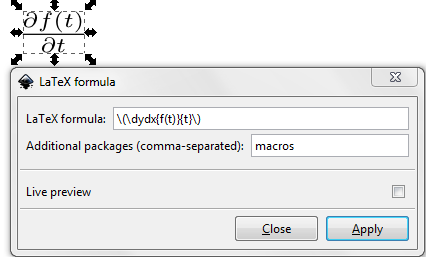

However, I have each chapter in a separate folder with all the images for that chapter. This works if the figures are in the main file. Step 4: To apply the changes to your current terminal session, run the following command.įinally, you can open the inkscape with pdflatex and function plotting functioning well in terminal by just type the key word alias inkscape to open the inkscape application.I am trying to use pdftex to lay out a document including images made in inkscape.įrom inkscape I can output the images as pdfs with accompanying pdf_tex files and put these in a figure environment. To save the alias, you can press Ctrl + X, then Y to save the changes. alias inkscape="open -a /Applications/inkscape.app" Step 2: Open appropriate shell configuration. Step 1: Determine which shell you are using. If you use inkscape frequently, you can save time by creating the alias for the command above in terminal. The LaTeX rendering and function plot rendering all worked as intended.
#Inkscape latex mac os
I just tested to run the following code in terminal on Mac OS Ventura using inkscape version 1.3. I know it it is not that straight forwards but it works at the end.
#Inkscape latex install
Out = exec_command( + latex_opts)ĭo not forget to install other dependencies mentioned in the readme of the mentioned repository.
#Inkscape latex download
copy the contents of extension folder from the download into this folder.go to this repository and download the latest stable version and unzip.textext extension has been around for a while, and now other people have taken over the development. But even if it was there, there is other solution which IMHO is better. Many features present on Windows and Linux, including the LaTeX equation import, is missing. Sad to see Inkscape on mac OS is lagging behind and we yet to see a stable native implementation.

You should then be able to open Inkscape and type latex formulas by going to Extension->Render->Mathematics->LaTex. Assuming the required LaTeX programs are already in your terminal's path (check with echo $PATH), this should work. Now at the end of this file, right above the last line exec "$CWD/bin/inkscape" add the paths that you extracted from step 1 and 2.įor example I should add the line: PATH=$PATH:/Library/TeX/texbin:/opt/local/binĪlternatively - especially if your installation doesn't have the script file - simply open Inkscape from the terminal: open -a /Applications/Inkscape.app/. With your desired editor, open (with sudo) the following file: /Applications/Inkscape.app/Contents/Resources/script.Now similarly find the PATH for pstoedit. I used macports here to to install this, and it worked for me. However, I tried installing it from a tar ball and it didn't work (probably cause I didn't have all the dependencies).



 0 kommentar(er)
0 kommentar(er)
